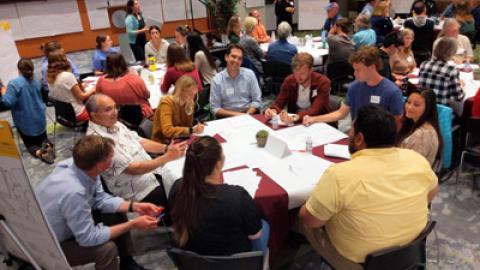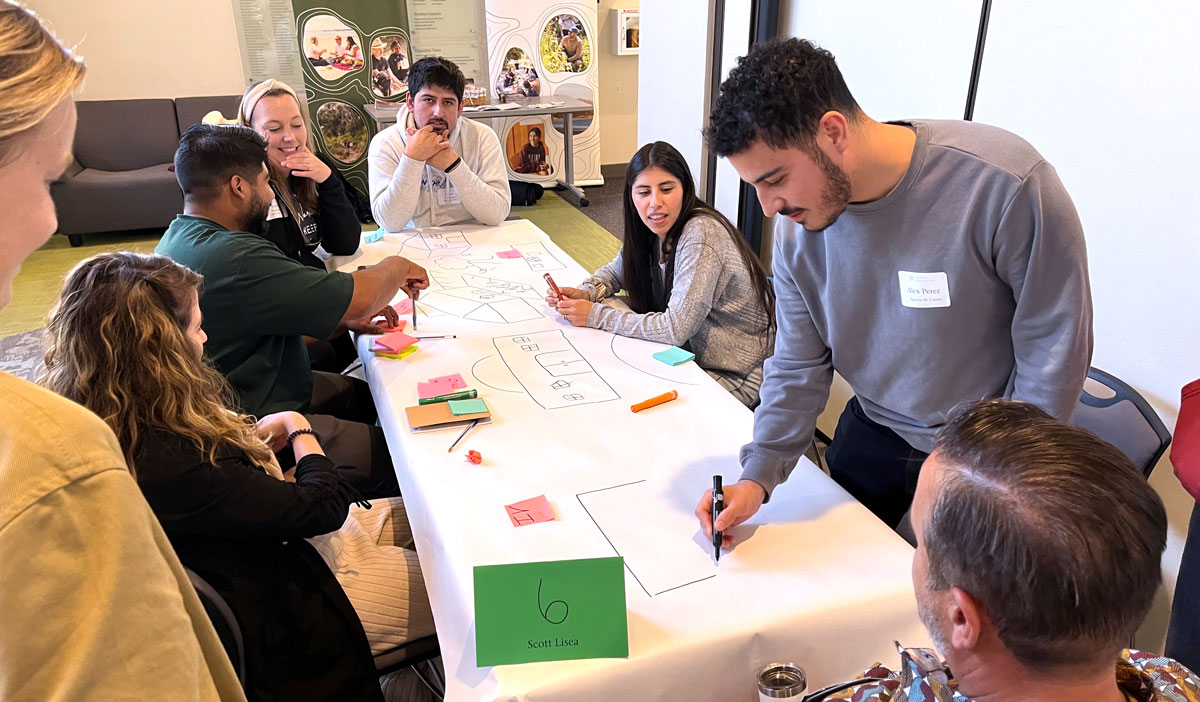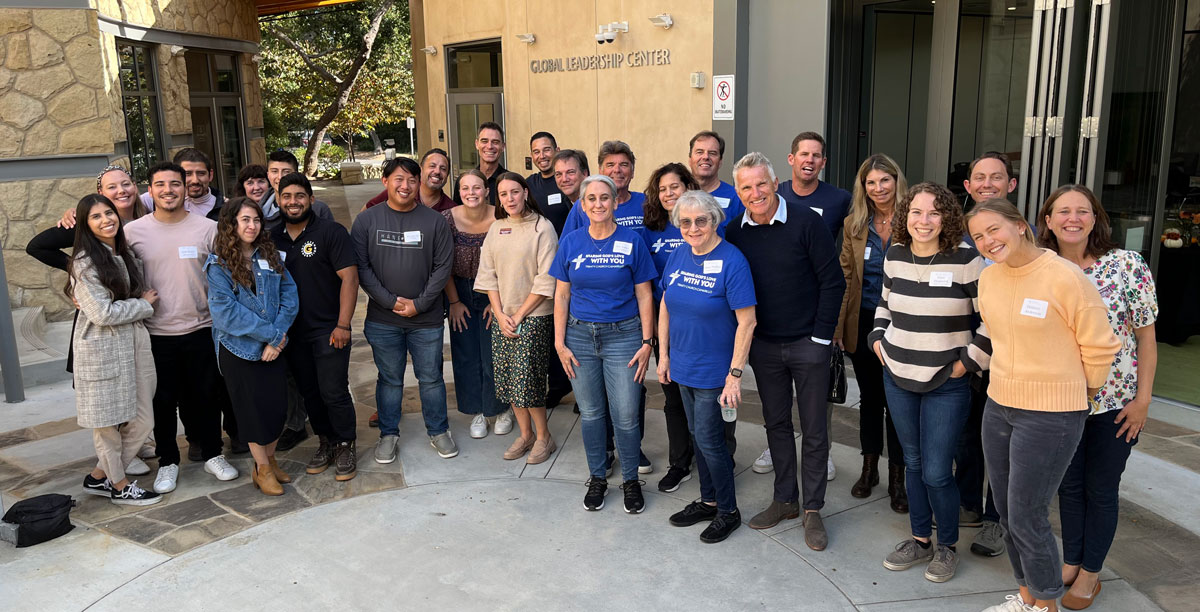How can your church stay attuned to its vocation in a changing world?
The Westmont Center for Thriving Communities is a free program that gathers diverse Central Coast churches to explore together where God might be calling our congregations. Through three daylong retreats, ongoing coaching, and seed-grant funding for new experiments in ministry, Thriving Communities invites area churches to consider together where we are, who we are, and how God might be prompting us to act in ways that promote authentic flourishing, both in our churches and in our neighborhoods.
2024-25 Cohort Retreat Dates
- September 27, 2025
- January 24, 2026
- October 24, 2026
..........
Thriving Communities is a catalyst. It feels like a huge gift that comes just at the right time.
- Keenan Barber, Pastor, Moorpark Presbyterian Church
A Changing World
The world is changing—and it always has been. In every time and place, Christians are called to rearticulate the Gospel in ways that address their context and their moment. Congregations on California’s Central Coast face many challenges and opportunities today as our churches and our society confront big questions—about what it means to love and serve other people, about changing patterns of religious practice, about threats to our natural and social world.
Some Necessary Tools
Many congregations want to freshly engage these challenges and opportunities—they want to be the Church for the present moment. But many lack the tools and spaces that make adaptation possible. At Thriving Communities, we equip one another to think strategically about where God might be calling us, drawing on a host of tools to understand our context, identify our values, grow through conflict, and take our next faithful steps in ministry.
Friends on the Journey
God’s Church on the Central Coast of California is deeper and wider than we usually see—it extends far beyond our own congregation or denomination. These diverse colleagues in the work of God’s Kingdom can help us see things we wouldn’t otherwise see, provide inspiration as we look ahead, and support us as co-laborers and friends. At Thriving Communities, we gather with Christians who are unlike us in order to listen together for the movement of God’s Spirit.
The Program
Each academic year, Thriving Communities gathers a small cohort of Central Coast congregations. Through daylong retreats at Westmont, ongoing conversation and coaching, and grant-funded new experiments in ministry, this learning community journeys together, supports one another, and seeks inspiration in following God's call to authentic vocation.
During their cohort year, participating congregations will have opportunities to:
- Investigate our changing ministry contexts. With the help of neighbors and colleagues in ministry, we’ll examine the needs, large and small, that shape our Central Coast communities and inform our work.
- Identify, celebrate, and develop the things that define our ministries. We’ll deeply consider and build on the authentic traditions, values, and practices that make us who we are, as individual congregations and as Christ’s servants on the Central Coast.
- Resolve conflict. Traditions, values, and practices are often contested, as are proposals for moving forward as complex institutions. Thriving Communities features a robust set of tools for hosting healthy dialogue across difference.
- Make decisions. Deep understanding of place, time, and self is likely to spur institutional change. But how do we evaluate or compare possible courses of action? Thriving Communities offers resources for thinking systematically about how churches can make quality decisions that account for all priorities and pressures.
- Connect with other churches who seek thriving in their congregations and neighborhoods. One of the largest benefits of the program is hearing from other churches in our diverse learning community as they share how they are encountering challenges, identifying opportunities, and responding to God’s call.
- Use mini-grants to pursue new learning and action. As they explore their next faithful steps in ministry, participating churches can apply for Thriving Communities grants to conceive and pilot new experiments.
Thriving Communities accepts a small number of churches each year to participate in a learning community; all Christian congregations in our region (roughly Thousand Oaks to San Luis Obispo) are welcome to apply. We ask that each congregation:
- Select a team of six church members (including at least one pastor and one member of your church governing body) who can commit to most or all program activities;
- Participate in three daylong plenary retreats on Westmont’s campus during the academic year;
- Supported by congregational grants, host your own conversations, activities, or events that are inspired by our time together at Westmont;
- Be in regular touch with a designated Westmont staff liaison, who will provide support and resources for your team;
- Share findings, insights, challenges, and plans with our learning community, at retreats and through our network of participating churches and organizations.
2025-26 Cohort Retreat Dates
Our daylong cohort retreats will be held at Westmont College on:
- Saturday, September 27, 2025
- Saturday, January 24, 2026
- Saturday, October 24, 2026
Cohort participants are invited to attend, free of charge, periodic conferences and events at Westmont that are especially relevant to the purposes of Thriving Communities. In past years, those have included public lectures and discussions, community conversations about the purposes and aims of church congregations, and Westmont's Conversation on the Liberal Arts and Lead Where You Stand conferences. Please inquire about these and other events at thriving@westmont.edu.
Thriving Communities is accepting applications for our 2025-26 cohort; in most cases, the application should be completed by the person who intends to lead the Thriving Communities team (often a member of the pastoral staff). Please contact us at thriving@westmont.edu to receive the application.
..........
During the retreat, participants could see that other churches experience the same struggles and issues. We’re all humans together, striving to please Jesus and work in our communities.
- Nick Tortorici, Pastor, Reality Church
Who is eligible to participate?
Christian churches in the Central Coast region of California are eligible to participate in Thriving Communities. Attendance is required at three plenary retreats in Santa Barbara; with that in mind, we suggest that churches on the 101 corridor between roughly Thousand Oaks and San Luis Obispo will find it practical to participate.
Why focus on the Central Coast?
Thriving Communities is committed not only to providing dialogue and resources for churches who seek to thrive, but doing so in a way that strengthens the place where God has planted us. We limit participation to the Central Coast to focus on needs that are local and particular, and to deepen relationships with others who encounter those same needs.
Is Thriving Communities a church consulting program?
We know and appreciate the good work that church consultants have done for congregations in our area. But we think of the purposes of Thriving Communities somewhat differently. If participation in the program prompts congregations to improve their programming, communication, administrative health, and the like, we certainly applaud those outcomes. But we’re most concerned that Central Coast communities—communities in which Westmont itself has a part—should become stronger, more relational, more integrated, and more caring. Our purpose is not to tell churches how to “fix” themselves, but to explore with congregations in our region big questions about our call to work toward God’s kingdom on earth, in the midst of pressing needs and rapid change.
Does Thriving Communities have a particular denominational or theological identity?
Westmont College identifies most closely with the broad tradition of American nondenominational evangelicalism. But it is important to us that Thriving Communities cohorts should not be limited to churches from that religious stream. Evangelical, Roman Catholic, Orthodox, mainline Protestant, or Pentecostal Christians will all see things about God’s work in the world that others miss, and that diversity of perspective is critical to our mutual understanding of our place and our calling.
What are the theological underpinnings of the work?
Two theological themes are central to the work of Thriving Communities. First, a robust doctrine of Christ’s incarnation suggests to us how important it is to be truly present in our neighborhoods. God came to the world not abstractly or theoretically, but tangibly, in a particular place, time, and culture. To follow Christ means to live into that radical model of presence. Second, and in distinction from the way the term is often used, we believe that Christian vocation is both clear and communal. Clear, in accordance with Jesus’ command to love God and to love our neighbor above all other priorities (Matthew 22). And communal, because of scripture’s wholesale witness to the importance of Christ’s entire body, and not just its individual members, in seeking, knowing, and doing God’s work in the world.
What dispositions are important for participants?
We hope that participants will come to Thriving Communities in an open, exploratory way, ready to hear what God’s Spirit is saying to the Church. We hope especially that church teams will be prepared to:
- listen to one another, and share their congregation’s own experience with others;
- reimagine their “circle of concern,” looking within and beyond their congregation to find communities that Christ’s body should serve;
- approach conversation and decision-making with a spirit of humility and openness to God's prompting;
- engage conflict as an opportunity for understanding and growth.
What does Thriving Communities cost?
Thanks to the generous support of Lilly Endowment Inc., Westmont is able to offer the Thriving Communities program entirely free of charge for participating churches. All program activities and lodging are covered, and we offer small mini-grants to churches for their own associated programming and projects.

Thursday, October 17, 2024 | 6:20pm-8:30pm, First Presbyterian Church, Santa Barbara (21 E. Constance St.)
Deepening political divisions are affecting congregations in significant ways. But how should churches engage? Should they stay entirely out of politics? Should they provide a forum for navigating contentious issues? Or should they develop and promote clear positions on political questions? The Westmont Center for Dialogue and Deliberation invites you to join us for a conversation (not a panel of experts, but real conversation) on Thursday, October 17, from 6:20 to 8:30pm at First Presbyterian Church, Santa Barbara. All are welcome--we just ask that you please RSVP at the link here.

Two pastors share their congregations' experiences with Thriving Communities.

Thursday, October 5, 2023 | 7pm-9pm, Westmont College Global Leadership Center
Churches can be many things: houses of worship, sites of learning, places for connection, hubs of service, and more. What's most important? What might God be calling your church to be, right here and now? Join us for guided round-table conversation based on leading models of healthy group dialogue. Come as an individual, or bring a group from your church. This event reprises a conversation that Westmont hosted in 2022; we invite participants in that event and newcomers alike to join in renewed discussion of the vital purposes of the church.

August 8, 2023 | 5-7:30pm, 321 Motor Way, SB
Please join us for a neighborhood walk in downtown Santa Barbara to learn more about the realities of human trafficking in our community. As we walk, you’ll have the chance to consider how our city is impacted by trafficking and exploitation and find opportunities for reflection, prayer, and hope as we discuss services and supports for survivors of this evil. We will begin our walk in the parking lot by SB Roasting Company (State and Gutierrez) at 5:30pm and will finish our walk by 7pm the same location. RSVP here, walk-ins welcome.

March 18, 2023
We can learn a lot about opportunities and challenges in our community by engaging Santa Barbara's public schools. Join Immigrant Hope and SB Council Member Oscar Gutierrez for a short walk through the Westside, with special emphasis on our institutions of primary education. We'll gather at 10am at Harding Elementary School (meet by the bridge) and conclude by noon. Families are welcome!



